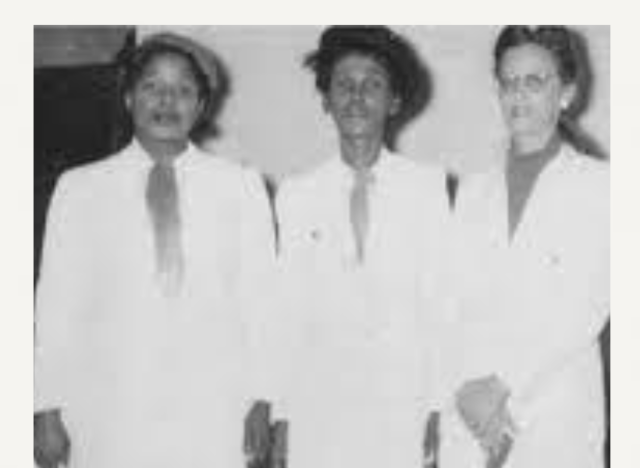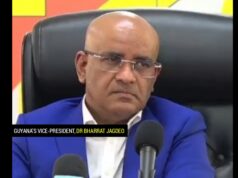By: Sueann Wickham
On Friday last, Guyana joined the rest of the world in celebrating International Women’s Day. Many stakeholders used that opportunity to honour the country’s women. This ranged from the hardworking and unbending spirit of our mothers, workers across all sectors and even those making history in male dominated fields. In keeping with the importance of this occasion, Guyana Standard will highlight the stories of three phenomenal Guyanese women who were the first to be elected to the House of Assembly, now known as the National Assembly or Parliament. These women are Janet Jagan, Jane Phillips-Gay, and Jessica Burnham. They were undoubtedly, the embodiment of resilience and a fierce commitment to social justice.
Their contributions to Guyana’s political landscape have left an indelible mark on history, inspiring future generations of leaders and activists.
In the annals of Guyana’s political landscape, the names Janet Jagan, Jane Phillips-Gay, and Jessica Burnham stand as pillars of resilience and progress. These remarkable women, each in their own right, shattered glass ceilings, defied societal norms, and blazed trails for generations to come.
Janet Jagan: A Trailblazer in Guyanese Politics
Born on October 20, 1920, in Chicago, Illinois, Jagan’s journey to political prominence was marked by determination and dedication. In 1942, while working as a student nurse in Chicago, she crossed paths with Cheddi Jagan, a dentistry student from British Guiana. Their union not only marked the beginning of a lifelong partnership but also ignited a shared passion for political activism.
By 1950, Janet and Cheddi had become deeply entrenched in the political landscape of British Guiana, culminating in the founding of the People’s Progressive Party (PPP) alongside Linden Forbes Burnham. This alliance, fueled by a fervent desire for independence, set the stage for monumental change in the colony.
Janet’s commitment to the cause was unwavering, despite facing criticism and adversity. Her tenure in various cabinet posts and roles within the PPP solidified her reputation as a formidable force in Guyanese politics. In 1997, following the untimely death of her husband Cheddi, Janet reluctantly stepped into the spotlight, accepting the nomination for the presidency. Despite facing scrutiny over her ethnicity and age, Janet emerged victorious in the 1997 election, etching her name in the annals of history as South America’s first elected female president.
Her presidency, though brief, was marked by resilience and resolve. Despite facing opposition and challenges, Janet’s legacy endures as a testament to the power of perseverance and conviction.
Jane Phillips-Gay: Champion of Trade Unionism and Equality
Jane Phillips-Gay, a trailblazer in her own right, emerged as a staunch advocate for labour rights and gender equality in British Guiana. Born into a world of privilege and prejudice, she defied societal expectations, carving out a path fueled by passion and purpose.
Her involvement in trade union activities in the 1940s laid the groundwork for her political ascent. As a founding member of the Guiana Industrial Workers Union (GIWU), her tireless advocacy on behalf of sugar workers resonated deeply with the masses. Her pivotal role in the Enmore Martyrs’ Day strike of 1948 cemented her status as a champion of the working class.
Phillips-Gay’s journey was not without its setbacks, but her resilience remained unwavering. As a member of the Women’s Political and Economic Organization (WPEO) and the People’s Progressive Party (PPP), she fought tirelessly for equal opportunities for women and marginalized communities.
Her contributions extended beyond the realm of politics, encompassing a steadfast commitment to social justice and public service. As chairperson of the Women’s Auxiliary, her efforts to uplift the marginalized and underserved left an indelible mark on Guyanese society.
Jessica Burnham: Educator, Activist, and Political Luminary
Jessica Irma Sampson Burnham’s story is one of resilience, tenacity, and unwavering dedication to the pursuit of justice. Burnham was also a prominent Guyanese educator and politician who left an indelible mark on the country’s political landscape. Born into a family deeply rooted in community service and education, her upbringing on Pike Street in the Kitty, Georgetown instilled in her a sense of duty and responsibility to her community.
Trained as a teacher, she embarked on a career in education, working at the Bedford Methodist school. However, her passion for social justice and equality led her to venture into the realm of politics.
In the historic 1953 elections to the House of Assembly, this Guyanese role model made history as one of the first female members elected alongside Janet Jagan and Jane Phillips-Gay, representing the Georgetown Central constituency. This groundbreaking achievement marked a significant milestone in Guyana’s political history, as these women became the first to break barriers and challenge the male-dominated political sphere.
Furthermore, her political journey was intertwined with that of her brother, Linden- Forbes Burnham, who would go on to become the first Prime Minister of Guyana. However, despite her initial alignment with the People’s Progressive Party (PPP), her convictions and principles led her to part ways with the party in October 1957.
Alongside her brother Forbes, she co-founded the People’s National Congress (PNC), with Forbes assuming leadership and served as an assistant secretary. However, disillusionment with the direction of the party led her to leave the PNC the following year.
Despite facing challenges and setbacks, Burnham remained steadfast in her pursuit of a more just and equitable society. Upon her return to the PPP, she authored a seminal booklet titled “Beware My Brother” in 1964. Her decision to publish the book was often referred to as a testament to her courage and conviction in the face of adversity. Why?
This publication served as a poignant critique of her brother’s leadership and the political landscape of Guyana at the time, reflecting Jessica’s unwavering dedication to truth and accountability.
It should be noted that Burnham’s legacy as a pioneering woman in Guyana’s political history is one of courage, resilience, and unwavering commitment to social justice. Her contributions to education, politics, and advocacy continue to inspire future generations of leaders and activists in Guyana and beyond.
As we reflect on the importance of International Women’s Day, let us honor the legacies of Janet Jagan, Jane Phillips-Gay, and Jessica Burnham. Their contributions to Guyana’s political landscape are a testament to the power of perseverance, courage, and conviction.
In addition, their stories serve as a reminder of the transformative power of women’s leadership and the enduring impact of their contributions to society.













